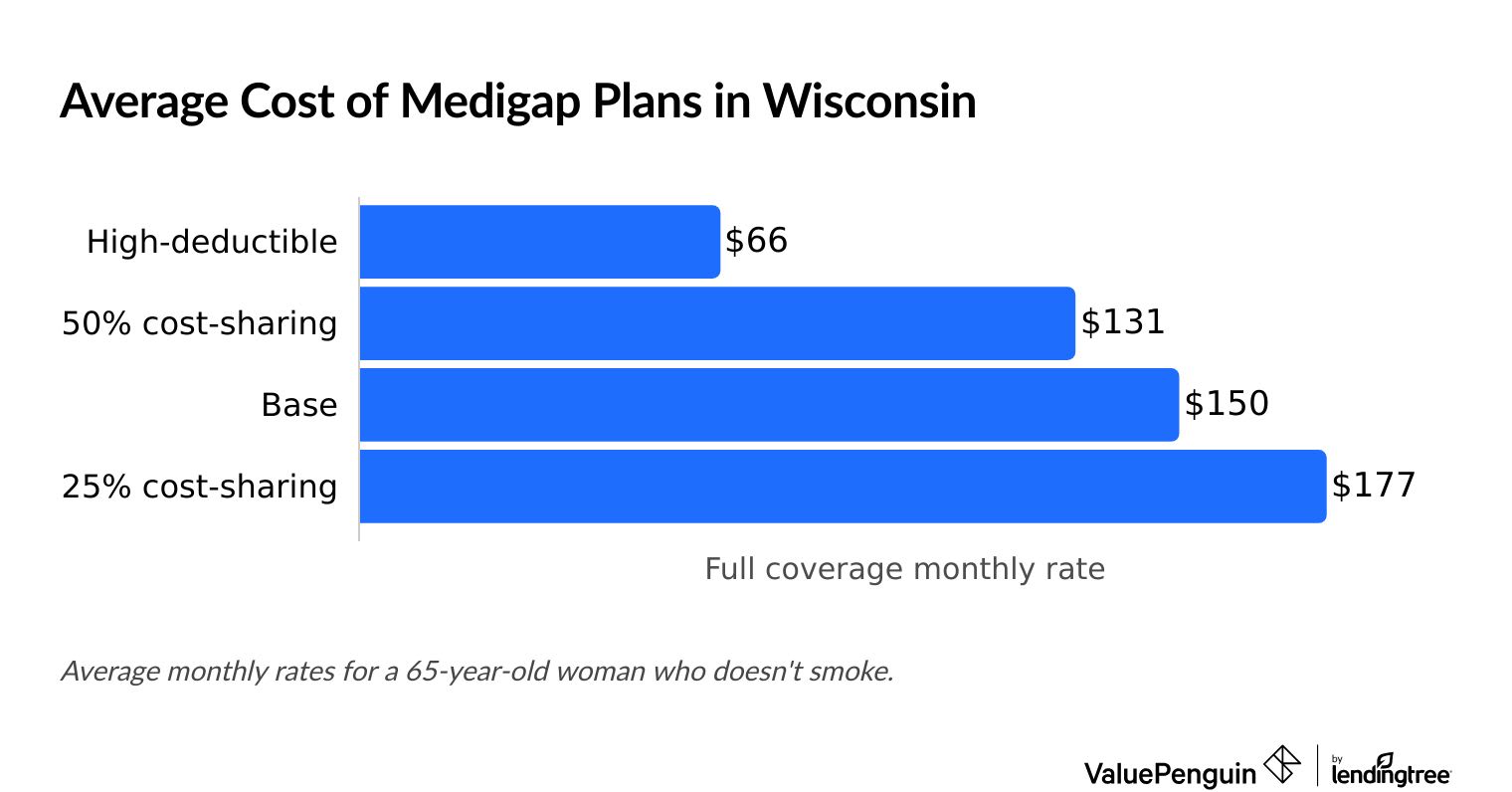What Are the Best Medicare Supplement Plans in Wisconsin? (2025)
Compare Medicare Plans in Your Area
Mutual of Omaha sells the best Base Medigap plans in Wisconsin. The company has a low average rate for regular Medigap coverage, called a Base plan. It also has the cheapest high-deductible plan among large companies and high customer satisfaction. For added benefits like vision, hearing and dental coverage, Wisconsin Physicians Service is the best choice.
If you want a plan that splits your medical costs with your insurance company, you can buy a cost-sharing plan through Humana. However, these usually aren't a good deal.
Medicare Supplement plans in Wisconsin
Wisconsin Medigap plans are different from plans in the rest of the country. Essentially, Wisconsin allows you to build your own Medigap policy. You start with the "Base" plan, the foundation of every Medigap plan in Wisconsin. The Base plan pays more of your medical bills than other plan types.
You can make changes to the Base plan by adding a $2,870 deductible or by splitting your medical costs with your insurance company in one of two ways. You can choose to pay 50% or 25% of your medical costs, while the insurance company picks up the rest. These are called the 50% cost-sharing plan and the 25% cost-sharing plan. Choosing one of these plan types might lower your monthly rate.
These plans all cover the same services as the Base plan.
Finally, you can add extra benefits to give yourself coverage for more medical services. For example, you pay more each month to get coverage for your foreign medical care or your Part A deductible.
What's the best Medicare Supplement company in Wisconsin?
Mutual of Omaha sells the best Medicare Supplement plans in Wisconsin.
Wisconsin Physicians Service has more extra benefits than other companies, so it's an option for added value.
Top Medicare Supplement companies in Wisconsin
Company | Base plan rate |
Customer satisfaction (out of 5.0)
| |
|---|---|---|---|
| Mutual of Omaha | $122 | 4.5 | |
| Wisconsin Physicians Service | $133 | 4.0 | |
| Physicians Mutual | $137 | 4.0 | |
| Aetna | $142 | 4.0 | |
| AARP/UHC | $270 | 4.0 | |
Compare Medicare Plans in Your Area
Best Base plan: Mutual of Omaha
-
Editor rating
- High-deductible: $54
- Base: $122
If you want a Base plan, Mutual of Omaha has the best Medicare Supplement plans in Wisconsin because of its low rates and high customer satisfaction. A Base plan costs $122 per month, or about 18% less than the state average. The company is also a good choice for a high-deductible plan.
A high-deductible plan from Mutual of Omaha costs 18% less than the state average.
A high-deductible plan means you'll have to pay the first $2,870 of your health care yourself before your coverage begins. But the plans can be a good choice if you only want coverage for catastrophic health events, like a bad injury or a severe illness.
Omaha Insurance, which is part of Mutual of Omaha, handles the company's Medicare Supplement plans in Wisconsin.
Best for added benefits: Wisconsin Physicians Services
If you want to boost your Medigap coverage with extra benefits, Wisconsin Physicians Services is the best choice. All Wisconsin Physician Mutual Medigap plans come with vision and hearing coverage. You can also get discounted dental coverage through Delta Dental.
Wisconsin Physicians Services also offers a 2% discount if you set up auto-pay through your bank, and you can get a 7% discount if you and a spouse, roommate or someone else in your household have a Wisconsin Physicians Services Medigap plan.
Cost-sharing plans: Humana Medigap
Humana is the only company to sell cost-sharing Medigap plans in Wisconsin.
Wisconsin has two cost-sharing plans available. With the 50% plan, you evenly split your medical bills with the insurance company. With the 25% plan, you only pay for 25% of your costs and the insurance company pays 75%. Cost-sharing plans cover the same medical situations as the Base plan. The only difference is how you split the cost with your insurance company.
Base plans offer better coverage than cost-sharing plans. Cost-sharing plans should cost less than Base plans because cost-sharing plans cover fewer costs. But because only one company in Wisconsin offers these plans, cost-sharing plans are usually a bad deal in the state.
For example, Humana's 25% cost-sharing plan costs $131 per month, on average, which is more expensive than an average priced base plan from Mutual of Omaha. Humana's 75% cost-sharing plan costs an average of $177 per month, which is more expensive than the average Wisconsin Base plan cost of $150 per month.
How much does a Medigap plan cost in Wisconsin?
Wisconsin Medicare Supplement Base plans cost between $122 and $270 per month, on average, for a 65-year-old woman who doesn't smoke.
Rates depend on the company and plan options you choose. You can also choose from a cost-sharing plan or a high-deductible plan option. In Wisconsin, you can choose extra coverage benefits, which will cost more.

Compare Medicare Plans in Your Area
Your age, gender and health also affect your rates. For example, a 65-year-old woman who doesn't smoke pays an average of $150 per month for a Base plan. But a man the same age pays an average of $167 per month. The same plan for a 75-year-old woman costs $188 per month, on average, while a 75-year-old man can expect to pay $210 per month.
Wisconsin Medicare Supplement plan costs
Medigap plan | Monthly cost |
|---|---|
| High-deductible | $66 |
| 50% cost-sharing | $131 |
| Base | $150 |
| 25% cost-sharing | $177 |
How does Medigap work in Wisconsin?
Wisconsin has its own system for Medigap plans that differs from the rest of the country.
When you buy a Medicare Supplement plan in Wisconsin, you start with a Base plan. The Base Wisconsin Medigap plan sets the coverage standards for Medigap in the state. The Base plan covers:
- Your part of Medicare Part A costs for hospital, skilled nursing facility and hospice care
- Inpatient mental health care for 175 days (in addition to what Medicare already covers)
- 40 home health care visits (in addition to what Medicare already covers)
- Your part of Medicare Part B doctor visit costs
- Three pints of blood per year for transfers
- All other benefits that the state of Wisconsin requires, like some cancer testing and diabetes treatment
Next, you can change your plan by turning it into the high-deductible version or into one of two cost-sharing plans.
If you opt for the high-deductible version of the Base plan, you have to pay the first $2,870 of your health care costs each year before your Medigap plan will start covering things. After that, your plan will pay all your covered costs.
The cost-sharing versions require you to split your health care costs with your insurance company each year until you reach an out-of-pocket maximum. For the 50% cost-sharing plan, you pay half of your medical costs until you reach $7,220. For the 25% cost-sharing plan, you pay 25% of your medical costs and your health insurance company pays 75% until you reach $3,610.
Finally, you have the option to add on extra benefits to create a policy that covers the medical situations you might face. These optional benefits might include:
- Coverage for your full Medicare Part A deductible
- Extra home health care
- Coverage for your full Part B deductible
- Coverage for Part B excess charges
- Foreign travel emergency care
- Coverage for half of your Part A deductible
- Coverage for any Part B copayments
Not all insurance companies offer the same options, though. If you want coverage for a specific situation, make sure to confirm that your company offers that benefit.
Frequently asked questions
What are the best Medicare Supplement plans in Wisconsin?
Mutual of Omaha has the best Base Medicare Supplement plans in Wisconsin. The company has low rates and good customer satisfaction. Humana is the best option for cost-sharing plans, and Wisconsin Physicians Service has the best added benefits.
How much is Medigap in Wisconsin?
The average Wisconsin Medigap base plan costs $150 per month, on average, for a 65-year-old woman who doesn't smoke. The amount you pay for coverage depends on factors like your age, gender, the company you choose and whether you smoke.
How are Medigap plans different in Wisconsin?
In Wisconsin, you start with a Base plan and then you can add extra coverage to personalize your policy. In other states, you can choose between several different Medigap plans, but you can't alter the coverage of the plans.
Methodology and sources
Medicare Supplement rates are averages based on cost data for private health insurance companies in Wisconsin. All costs are averages for a 65-year-old woman who does not smoke, unless otherwise noted. The rates represent costs for enrollees who signed up for Medigap when they turned 65. Only companies with a 2.7% or higher market share in Wisconsin were considered in this analysis.
Our editors chose the best companies based on an analysis of their rates and complaint data collected by the National Association of Insurance Commissioners (NAIC). Other sources include Medicare.gov, the Centers for Medicare and Medicaid (CMS) and the Wisconsin Office of the Commissioner of Insurance.
Customer satisfaction was ranked based on average complaint data from the National Association of Insurance Commissioners (NAIC). The data was converted into a ranking on a five-point scale. Lower scores mean fewer complaints, which translates to better customer service.
Satisfaction score | Customer complaints adjusted for company size |
|---|---|
| 5.0 (top rating) | Over 75% fewer complaints than typical |
| 4.5 | 50% to 75% fewer complaints than typical |
| 4.0 | 25% to 50% fewer complaints than typical |
| 3.5 | 0% to 25% fewer complaints than typical |
| 3.0 | An average rate of complaints |
| 2.5 | 0% to 50% more complaints than typical |
| 2.0 | 50% to 100% more complaints than typical |
| 1.5 | 100% to 250% more complaints than typical |
| 1.0 | Over 250% more complaints than typical |
Senior Writer
Talon Abernathy is a ValuePenguin Senior Writer who specializes in health insurance, Medicare and Medicaid. He's also contributed to other insurance verticals including home, renters, auto, motorcycle and flood insurance.
Talon came to ValuePenguin in 2023. Since his arrival, he's helped to expand the site's health insurance-related content offerings. He enjoys helping readers understand the ins and outs of America's all too complicated health insurance landscape.
Before coming to ValuePenguin, Talon worked as a freelance writer. His prior work has touched on a broad range of personal finance-related topics including credit-building strategies, small business incorporation tactics and creative ways to save for retirement.
Insurance tip
In many parts of the country, you can qualify for a free Silver health insurance plan if you meet certain income requirements. Government subsidies in the form of premium tax credits and cost-sharing reductions may mean you'll pay nothing for coverage.
Expertise
- Health insurance
- Medicare and Medicaid
- Flood insurance
- Homeowners insurance
- Renters insurance
- Auto and motorcycle insurance
Referenced by
- The Miami Herald
- Money.com
- MSN
- Nasdaq
- The Sacramento Bee
- Yahoo! Finance
Education
- BA, University of Washington
- Certificate in Copyediting, UC San Diego
Editorial Note: We are committed to providing accurate content that helps you make informed financial decisions. Our partners have not endorsed or commissioned this content.










